
Dates don’t tend to top the list when we talk about healthy food. They have benefits, sure, but they’re also pretty unexciting. Still, we must ask, are dates good for you, and should you be eating them regularly?
There’s a huge variety of dates, with more than 200 different varieties. These vary in their texture and flavor, although the nutritional profile is always similar. So, you’ll see most of the same effects, regardless of the type of date that you choose.
Medjool dates are the most well-known. These are soft, sweet, and surprisingly large. Their moisture content makes it easy to eat them directly. Other types include piarom dates, barhi dates, and thoory dates, to name just a few.
Dates also have a long history. Their cultivation even dates back an impressive 4,000 years and perhaps much longer. Plus, the date palm is sometimes called the ‘Tree of Life’, which tells you all you need to know about how well-respected dates are.
Are Dates Good For You?
- The Benefits Of Dates
- The Problems With Dates
- Can Dates Help You Lose Weight
- Are Dates Fresh Or Dried?
- Ways To Use Dates
- Things To Watch Out For
- Final Thoughts
The Benefits Of Dates
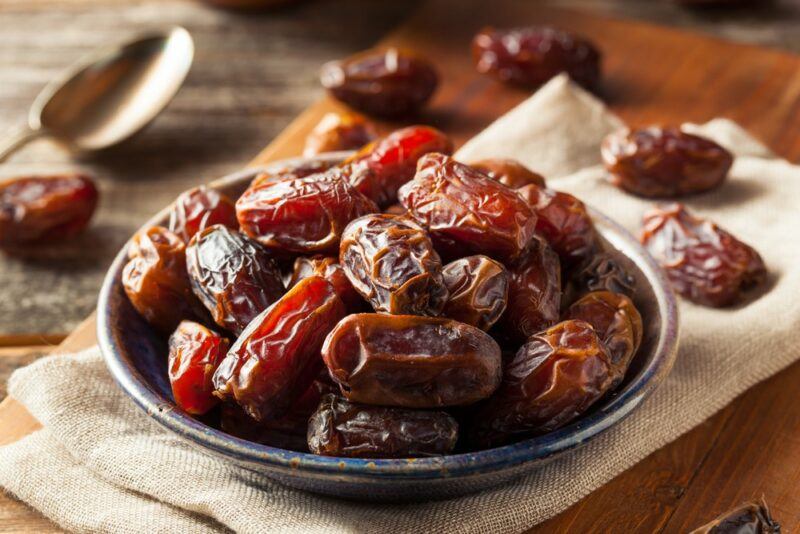
They Have Powerful Digestive Benefits
Dates, like prunes, are often associated with improved digestion. This effect happens because of their high soluble fiber content. This fiber helps to bulk out your stool and make it softer – a combination of features that is perfect for reducing constipation.
The fiber also acts as a prebiotic. This means that your gut bacteria can use the fiber as food. The effect is crucial. Honestly, prebiotics are just as important as probiotics for your gut health.
Fiber also helps to keep your blood sugar more balanced. This is why dates don’t spike your blood sugar as much as you would expect. The effect makes dates a relatively good snack for people with diabetes (one that’s much better than a candy bar).
The Nutrients And Plant-Based Compounds
Dates are a concentrated source of many nutrients, including iron, B vitamins, magnesium, and potassium. These nutrients can all help to boost your health and they’re not even the most powerful feature.
The iron is especially important, as it’s easy to be iron deficient. The risk of iron deficiency is higher if you’re relying on a plant-based diet. While dates don’t give you all the iron you need, they can certainly help.
Beyond the nutrients, dates also offer an array of potent antioxidants, including flavonoids, phenolic acid, and carotenoids.
Antioxidants like these help to reduce oxidative stress and protect your body from free radicals. Such effects have been linked to countless benefits, like decreasing inflammation and lowering the risk of diseases like diabetes, Alzheimer’s disease, eye-related conditions, heart disease, and some types of cancer.
Antioxidants aren’t unusual. You’ll find them in most plant-based foods. But, dates stand out, as they contain more antioxidants per serving than many other types of fruit. This is particularly true for dried dates. Why not use them as an easy way to boost your antioxidant intake?
Might Decrease Inflammation
Somewhat surprisingly, dates may help to reduce inflammation and, by extension, lower your risk of inflammation-related diseases. The effect is unexpected because dates are high in sugar and there’s a strong link between sugar intake and inflammation.
Even so, dates have some advantages, including the fact that they’re natural and unprocessed, their fiber content, and their antioxidants. Studies have highlighted this effect, showing that dates really do decrease inflammation.
However, the inflammation-reducing effect comes from using whole dates. You’re not likely to see the same outcome if you use dates or date sugar as an alternative type of sugar in recipes. In that situation, the dates are likely to have a similar effect to other sources of sugar.
Could Improve Labor
The link between dates and natural labor is more than just an old wives’ tale. Studies show that eating dates in the month or so before labor appears to increase the chance of entering labor naturally and decrease the time spent in labor.
This effect doesn’t guarantee that dates will help with your labor. Still, they’re a delicious natural snack, so why not give them a try?
The digestive benefits of dates are important here too, as these can help with constipation and other symptoms that sometimes come with pregnancy.
May Lower Heart Disease Risk
Some of the features of dates are directly relevant to your heart disease risk. The soluble fiber, for example, can decrease levels of LDL cholesterol, along with blood pressure and blood sugar levels.
The antioxidants are relevant too, as these may lower your triglycerides, which is important for your heart disease risk as well.
The Problems With Dates
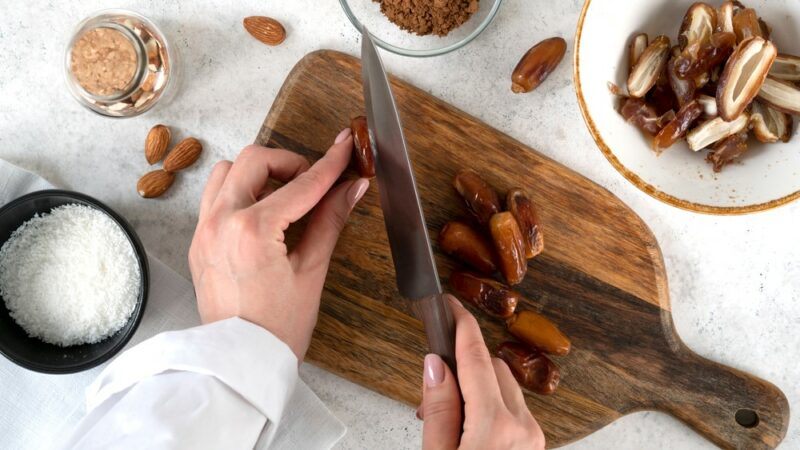
Their Oxalate Content
The first problem is that dates are high in oxalates. Oxalates are naturally occurring plant-compounds. They’re not dangerous in themselves, as our body expels them. However, oxalates can accumulate and increase the risk of kidney stones.
You don’t need to cut out all oxalate-containing foods. But, it’s worth being cautious with high oxalate foods, especially if you’ve had a kidney stone in the past.
Dates are concerning, as you may get as much as 24 milligrams of oxalates in a single date. That’s far too much for many people.
The Amount Of Sugar
Dates are high in sugar, particularly if they’re dried. For example, a single pitted date weighs roughly 7 grams and contains 4 grams of sugar.
While dates may be better than processed snacks, each date still ends up being more sugar than anything else. That’s not a good thing, especially with obesity and inflammation being so common these days.
The sugar content also means that dates are high in carbs. The carb content might be an issue too. After all, there’s growing concern that the modern focus on high carb foods has led to many of the health problems that we see today.
There Are Side Effects
Eating too many dates can cause a surprising number of side effects, including problems like bloating, a sore stomach, and constipation.
These are common symptoms when people significantly increase their fiber intake, or if they do so without drinking enough water. To get around this, start slowly with dates (and any other fiber rich foods or supplements). Make sure that you drink plenty of water too.
There’s also the risk of mold, which can lead to side effects like skin rashes and even allergic reactions. This is why you should always look for a reliable supplier, particularly if you’re buying dried dates.
The High Potassium Content
The potassium content of dates can also be a problem in some cases. If you already eat many potassium rich foods or are overdoing it with the dates, then you might put yourself at risk of hyperkalemia. This is where your blood potassium levels are too high and it can be a dangerous condition.
Potassium is processed in the kidneys, so anyone with kidney disease or poor kidney function may need to be cautious with the amount that they consume. Talk to your doctor to work out the best potassium intake for you.
Can Dates Help You Lose Weight?
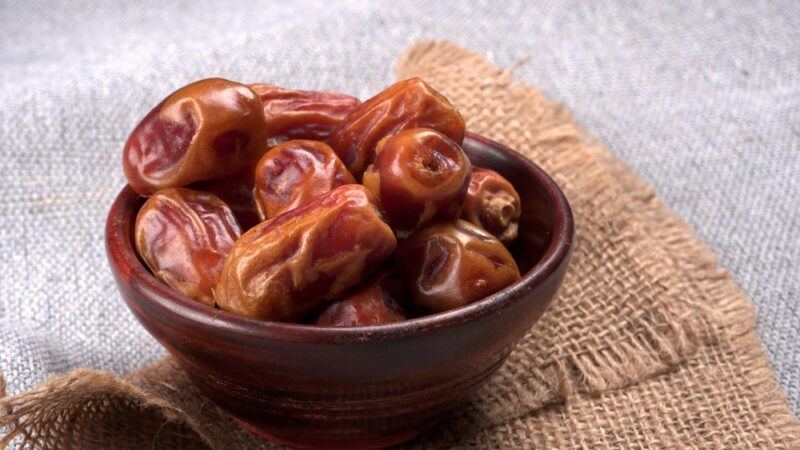
Dates are sometimes promoted as a weight loss aid. This is partly because they’re high in fiber and offer more protein than you might expect. Fiber and protein rich foods tend to keep you satisfied and are an easy choice for weight loss.
Plus, they’re natural, so snacking on them is much better than having a candy bar or something similar. You can also use dates to create homemade treats that are lower in calories and sugar than commercial products.
Some authors even suggest that eating four or so dates per day could directly help with weight loss, which seems completely unrealistic. After all, while dates contain some fiber and protein, they’re hardly amazing in either area. You’d get more of both macronutrients from legumes and plenty of other foods.
Don’t forget about the sugar content either. 100 grams of medjool dates contains 66 grams of sugar. That’s no small amount.
High sugar foods like this are never a wise weight loss choice. How could they be?
In the end, it’s better to see dates as a treat, rather than as something that will directly help with weight loss.
Are Dates Fresh Or Dried?
Dates can be slightly confusing, as there are both fresh and dried versions. Dried dates are often found in the baking section of the grocery store, while fresh versions are often found with the produce.
Dried dates and fresh dates both contain the same nutrients. However, dried dates have less water, so you get more nutrients, antioxidants, and sugar per 100 grams.
This means that you need to be more careful with your portion sizes for dried dates compared to fresh ones. The same is true for all dried fruits.
Ways To Use Dates

The simplest way to use dates is to eat them as-is. Medjool dates are an easy choice here, as they’re soft and delicious. They’re also easy to find.
However, this is far from the only approach. In fact, dates are actually much more versatile than you might expect. You can use them in both sweet and savory dishes.
For example, have you ever tried dates in ice cream or eaten sticky date pudding?
As for savory dishes, a surprisingly delicious approach is to wrap dates in bacon and cook them. You could even stuff them with cheese, almonds, or some other ingredient. Bacon wrapped dates make an excellent party appetizer.
Those are just a few ideas. There are also plenty of recipes that rely on dates, including baked food and even meals.
In many cases, the focus isn’t even on the flavor or texture of the dates. Instead, the dates may be blended and used as a natural sweetener instead. You’ll often see them used in dessert recipes instead of sugar.
Things To Watch Out For
The biggest problem with dates is perception. They’re often seen as a much healthier source of sweetness than table sugar. This is why you’ll find countless desserts, protein bars, and ‘healthy’ snacks that use dates instead of sugar.
Bliss balls are a classic example of this pattern. They rely on ingredients like dates, nuts, shredded coconut, sea salt, and chocolate to give you a delicious snack that’s often packed with protein.
The balls often avoid additives entirely and they’re much less processed than regular grocery store fare. But, this doesn’t make them a type of health food.
Natural ingredients or not, bliss balls are still incredibly calorie dense. The dates provide a lot of sugar and you’re also getting plenty of fat from the nuts and other ingredients.
Foods like bliss balls may be useful when they fit well into your diet. We’re not denying that. However, because of how they’re marketed, many people think of bliss balls as a healthy snack, one that’s going to give them benefits.
That’s not the case at all. Instead, you could easily gain weight from bliss balls. In fact, if you compare nutritional profiles, you’ll find that some bliss balls are just as bad for you as a candy bar or a piece of cake.
The same pattern holds true for many other date-sweetened foods.
This doesn’t mean that you need to avoid using dates for sweetness. The approach could still be better than relying on refined table sugar. Just be sure to remember that your finished snack is best seen as a treat, not a type of health food.
Final Thoughts
In the end, dates can be healthy, giving you some fiber and nutrients, along with plenty of antioxidants. They’re also a much better snack than a processed candy bar or something similar.
It’s even possible to include dates on a keto diet, if you’re cautious about the amount that you use. And really, that’s the trick with dates and most types of food. Rather than cutting foods out of your diet entirely, be sensible with your quantities, along with your overall sugar and calorie intake. If you do this, then most foods will end up being good for you.
Frequently Asked Questions
Are Dates Good For Constipation?
Dates are famous for helping with constipation and this isn’t just a marketing ploy. The fiber is a key reason for this effect, as it softens your stool, bulks it out, and makes it easier to pass.
That combination of features can be powerful for reducing constipation. However, dates aren’t the best type of dried fruit to help you. Prunes tend to be much more powerful because their sorbitol content is higher.
Interestingly, dates can also cause constipation in some situations. This is most likely if you’ve suddenly increased your fiber intake or aren’t drinking enough water.
Should Dates Be Refrigerated?
Dates can be stored at room temperature without a problem. If you keep them at room temperature in an airtight container, they should last for up to six months.
They can also be kept in the fridge and will last for roughly the same amount of time. Storing them for longer doesn’t work so well, as they tend to lose moisture.
You can also freeze dates. They’ll last for roughly a year this way, which is helpful if you have too many and can’t get through them in time.
How Many Dates Should I Eat A Day?
For most people, around 5 to 6 dates per day is the most you should be eating, which is enough to provide you with plenty of fiber. Going higher than this can be an issue because of the sugar content.
Of course, your health and needs are a factor too. You might be able to consume more dates than this if you’re not getting much sugar elsewhere in your diet.
Are Dates A Superfood?
You might call dates a superfood, as they’re a decent source of nutrients, antioxidants, and fiber. They could even improve your health.
However, the term superfood is also majorly overused. Most fruits, vegetables, and legumes have been called superfoods at least once – to the extent that the word no longer means anything. So, rather than focusing on the superfood idea, it’s much better to simply consume a variety of nutrient-dense whole foods every day.
Are Dates High In Sugar?
A single pitted date contains roughly 5 grams of sugar, although the amount will vary depending on the size and variety of the date. This is natural sugar, rather than added sugar, which is always a good thing.
Still, sugar is sugar and 5 grams of it per date is a decent amount. If you have a few dates in a serving, this sugar content starts to add up quickly.

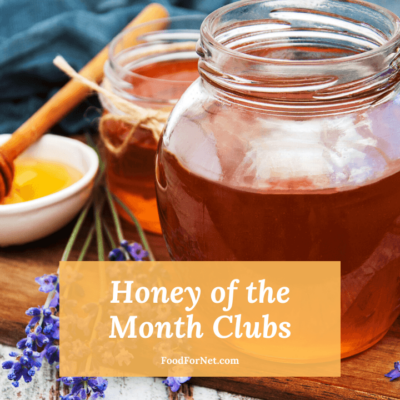


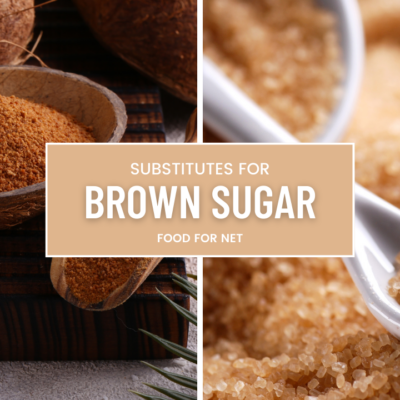
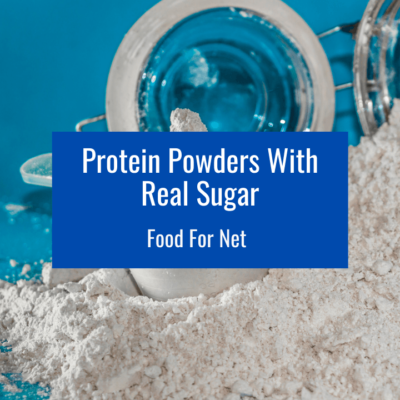

 Is Dark Chocolate Good For You?
Is Dark Chocolate Good For You?
Leave a Reply